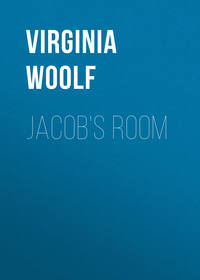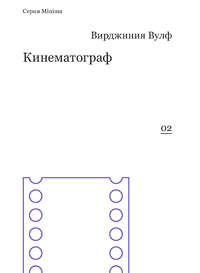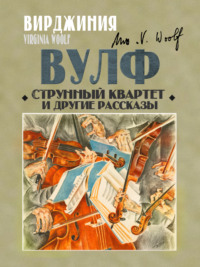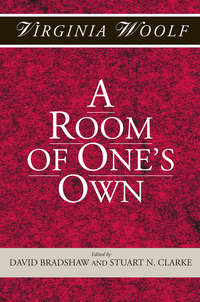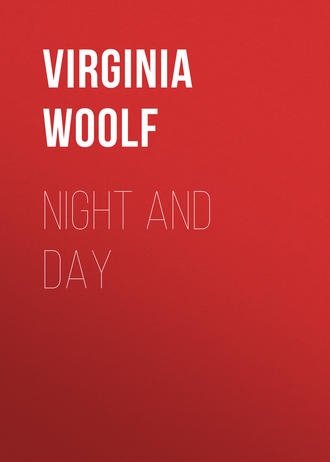 полная версия
полная версияNight and Day
“I think the bull was only a cow, Aunt Celia,” said Katharine.
“My darling, it was a great red Devonshire bull, and not long after it gored a man to death and had to be destroyed. And your mother forgave Susan – a thing I could never have done.”
“Maggie’s sympathies were entirely with Susan and the sailor, I am sure,” said Mrs. Cosham, rather tartly. “My sister-in-law,” she continued, “has laid her burdens upon Providence at every crisis in her life, and Providence, I must confess, has responded nobly, so far – ”
“Yes,” said Katharine, with a laugh, for she liked the rashness which irritated the rest of the family. “My mother’s bulls always turn into cows at the critical moment.”
“Well,” said Mrs. Milvain, “I’m glad you have some one to protect you from bulls now.”
“I can’t imagine William protecting any one from bulls,” said Katharine.
It happened that Mrs. Cosham had once more produced her pocket volume of Shakespeare, and was consulting Ralph upon an obscure passage in “Measure for Measure.” He did not at once seize the meaning of what Katharine and her aunt were saying; William, he supposed, referred to some small cousin, for he now saw Katharine as a child in a pinafore; but, nevertheless, he was so much distracted that his eye could hardly follow the words on the paper. A moment later he heard them speak distinctly of an engagement ring.
“I like rubies,” he heard Katharine say.
“To be imprison’d in the viewless winds, And blown with restless violence round about The pendant world…”Mrs. Cosham intoned; at the same instant “Rodney” fitted itself to “William” in Ralph’s mind. He felt convinced that Katharine was engaged to Rodney. His first sensation was one of violent rage with her for having deceived him throughout the visit, fed him with pleasant old wives’ tales, let him see her as a child playing in a meadow, shared her youth with him, while all the time she was a stranger entirely, and engaged to marry Rodney.
But was it possible? Surely it was not possible. For in his eyes she was still a child. He paused so long over the book that Mrs. Cosham had time to look over his shoulder and ask her niece:
“And have you settled upon a house yet, Katharine?”
This convinced him of the truth of the monstrous idea. He looked up at once and said:
“Yes, it’s a difficult passage.”
His voice had changed so much, he spoke with such curtness and even with such contempt, that Mrs. Cosham looked at him fairly puzzled. Happily she belonged to a generation which expected uncouthness in its men, and she merely felt convinced that this Mr. Denham was very, very clever. She took back her Shakespeare, as Denham seemed to have no more to say, and secreted it once more about her person with the infinitely pathetic resignation of the old.
“Katharine’s engaged to William Rodney,” she said, by way of filling in the pause; “a very old friend of ours. He has a wonderful knowledge of literature, too – wonderful.” She nodded her head rather vaguely. “You should meet each other.”
Denham’s one wish was to leave the house as soon as he could; but the elderly ladies had risen, and were proposing to visit Mrs. Hilbery in her bedroom, so that any move on his part was impossible. At the same time, he wished to say something, but he knew not what, to Katharine alone. She took her aunts upstairs, and returned, coming towards him once more with an air of innocence and friendliness that amazed him.
“My father will be back,” she said. “Won’t you sit down?” and she laughed, as if now they might share a perfectly friendly laugh at the tea-party.
But Ralph made no attempt to seat himself.
“I must congratulate you,” he said. “It was news to me.” He saw her face change, but only to become graver than before.
“My engagement?” she asked. “Yes, I am going to marry William Rodney.”
Ralph remained standing with his hand on the back of a chair in absolute silence. Abysses seemed to plunge into darkness between them. He looked at her, but her face showed that she was not thinking of him. No regret or consciousness of wrong disturbed her.
“Well, I must go,” he said at length.
She seemed about to say something, then changed her mind and said merely:
“You will come again, I hope. We always seem” – she hesitated – “to be interrupted.”
He bowed and left the room.
Ralph strode with extreme swiftness along the Embankment. Every muscle was taut and braced as if to resist some sudden attack from outside. For the moment it seemed as if the attack were about to be directed against his body, and his brain thus was on the alert, but without understanding. Finding himself, after a few minutes, no longer under observation, and no attack delivered, he slackened his pace, the pain spread all through him, took possession of every governing seat, and met with scarcely any resistance from powers exhausted by their first effort at defence. He took his way languidly along the river embankment, away from home rather than towards it. The world had him at its mercy. He made no pattern out of the sights he saw. He felt himself now, as he had often fancied other people, adrift on the stream, and far removed from control of it, a man with no grasp upon circumstances any longer. Old battered men loafing at the doors of public-houses now seemed to be his fellows, and he felt, as he supposed them to feel, a mingling of envy and hatred towards those who passed quickly and certainly to a goal of their own. They, too, saw things very thin and shadowy, and were wafted about by the lightest breath of wind. For the substantial world, with its prospect of avenues leading on and on to the invisible distance, had slipped from him, since Katharine was engaged. Now all his life was visible, and the straight, meager path had its ending soon enough. Katharine was engaged, and she had deceived him, too. He felt for corners of his being untouched by his disaster; but there was no limit to the flood of damage; not one of his possessions was safe now. Katharine had deceived him; she had mixed herself with every thought of his, and reft of her they seemed false thoughts which he would blush to think again. His life seemed immeasurably impoverished.
He sat himself down, in spite of the chilly fog which obscured the farther bank and left its lights suspended upon a blank surface, upon one of the riverside seats, and let the tide of disillusionment sweep through him. For the time being all bright points in his life were blotted out; all prominences leveled. At first he made himself believe that Katharine had treated him badly, and drew comfort from the thought that, left alone, she would recollect this, and think of him and tender him, in silence, at any rate, an apology. But this grain of comfort failed him after a second or two, for, upon reflection, he had to admit that Katharine owed him nothing. Katharine had promised nothing, taken nothing; to her his dreams had meant nothing. This, indeed, was the lowest pitch of his despair. If the best of one’s feelings means nothing to the person most concerned in those feelings, what reality is left us? The old romance which had warmed his days for him, the thoughts of Katharine which had painted every hour, were now made to appear foolish and enfeebled. He rose, and looked into the river, whose swift race of dun-colored waters seemed the very spirit of futility and oblivion.
“In what can one trust, then?” he thought, as he leant there. So feeble and insubstantial did he feel himself that he repeated the word aloud.
“In what can one trust? Not in men and women. Not in one’s dreams about them. There’s nothing – nothing, nothing left at all.”
Now Denham had reason to know that he could bring to birth and keep alive a fine anger when he chose. Rodney provided a good target for that emotion. And yet at the moment, Rodney and Katharine herself seemed disembodied ghosts. He could scarcely remember the look of them. His mind plunged lower and lower. Their marriage seemed of no importance to him. All things had turned to ghosts; the whole mass of the world was insubstantial vapor, surrounding the solitary spark in his mind, whose burning point he could remember, for it burnt no more. He had once cherished a belief, and Katharine had embodied this belief, and she did so no longer. He did not blame her; he blamed nothing, nobody; he saw the truth. He saw the dun-colored race of waters and the blank shore. But life is vigorous; the body lives, and the body, no doubt, dictated the reflection, which now urged him to movement, that one may cast away the forms of human beings, and yet retain the passion which seemed inseparable from their existence in the flesh. Now this passion burnt on his horizon, as the winter sun makes a greenish pane in the west through thinning clouds. His eyes were set on something infinitely far and remote; by that light he felt he could walk, and would, in future, have to find his way. But that was all there was left to him of a populous and teeming world.
CHAPTER XIII
The lunch hour in the office was only partly spent by Denham in the consumption of food. Whether fine or wet, he passed most of it pacing the gravel paths in Lincoln’s Inn Fields. The children got to know his figure, and the sparrows expected their daily scattering of bread-crumbs. No doubt, since he often gave a copper and almost always a handful of bread, he was not as blind to his surroundings as he thought himself.
He thought that these winter days were spent in long hours before white papers radiant in electric light; and in short passages through fog-dimmed streets. When he came back to his work after lunch he carried in his head a picture of the Strand, scattered with omnibuses, and of the purple shapes of leaves pressed flat upon the gravel, as if his eyes had always been bent upon the ground. His brain worked incessantly, but his thought was attended with so little joy that he did not willingly recall it; but drove ahead, now in this direction, now in that; and came home laden with dark books borrowed from a library.
Mary Datchet, coming from the Strand at lunch-time, saw him one day taking his turn, closely buttoned in an overcoat, and so lost in thought that he might have been sitting in his own room.
She was overcome by something very like awe by the sight of him; then she felt much inclined to laugh, although her pulse beat faster. She passed him, and he never saw her. She came back and touched him on the shoulder.
“Gracious, Mary!” he exclaimed. “How you startled me!”
“Yes. You looked as if you were walking in your sleep,” she said. “Are you arranging some terrible love affair? Have you got to reconcile a desperate couple?”
“I wasn’t thinking about my work,” Ralph replied, rather hastily. “And, besides, that sort of thing’s not in my line,” he added, rather grimly.
The morning was fine, and they had still some minutes of leisure to spend. They had not met for two or three weeks, and Mary had much to say to Ralph; but she was not certain how far he wished for her company. However, after a turn or two, in which a few facts were communicated, he suggested sitting down, and she took the seat beside him. The sparrows came fluttering about them, and Ralph produced from his pocket the half of a roll saved from his luncheon. He threw a few crumbs among them.
“I’ve never seen sparrows so tame,” Mary observed, by way of saying something.
“No,” said Ralph. “The sparrows in Hyde Park aren’t as tame as this. If we keep perfectly still, I’ll get one to settle on my arm.”
Mary felt that she could have forgone this display of animal good temper, but seeing that Ralph, for some curious reason, took a pride in the sparrows, she bet him sixpence that he would not succeed.
“Done!” he said; and his eye, which had been gloomy, showed a spark of light. His conversation was now addressed entirely to a bald cock-sparrow, who seemed bolder than the rest; and Mary took the opportunity of looking at him. She was not satisfied; his face was worn, and his expression stern. A child came bowling its hoop through the concourse of birds, and Ralph threw his last crumbs of bread into the bushes with a snort of impatience.
“That’s what always happens – just as I’ve almost got him,” he said. “Here’s your sixpence, Mary. But you’ve only got it thanks to that brute of a boy. They oughtn’t to be allowed to bowl hoops here – ”
“Oughtn’t to be allowed to bowl hoops! My dear Ralph, what nonsense!”
“You always say that,” he complained; “and it isn’t nonsense. What’s the point of having a garden if one can’t watch birds in it? The street does all right for hoops. And if children can’t be trusted in the streets, their mothers should keep them at home.”
Mary made no answer to this remark, but frowned.
She leant back on the seat and looked about her at the great houses breaking the soft gray-blue sky with their chimneys.
“Ah, well,” she said, “London’s a fine place to live in. I believe I could sit and watch people all day long. I like my fellow-creatures…”
Ralph sighed impatiently.
“Yes, I think so, when you come to know them,” she added, as if his disagreement had been spoken.
“That’s just when I don’t like them,” he replied. “Still, I don’t see why you shouldn’t cherish that illusion, if it pleases you.” He spoke without much vehemence of agreement or disagreement. He seemed chilled.
“Wake up, Ralph! You’re half asleep!” Mary cried, turning and pinching his sleeve. “What have you been doing with yourself? Moping? Working? Despising the world, as usual?”
As he merely shook his head, and filled his pipe, she went on:
“It’s a bit of a pose, isn’t it?”
“Not more than most things,” he said.
“Well,” Mary remarked, “I’ve a great deal to say to you, but I must go on – we have a committee.” She rose, but hesitated, looking down upon him rather gravely. “You don’t look happy, Ralph,” she said. “Is it anything, or is it nothing?”
He did not immediately answer her, but rose, too, and walked with her towards the gate. As usual, he did not speak to her without considering whether what he was about to say was the sort of thing that he could say to her.
“I’ve been bothered,” he said at length. “Partly by work, and partly by family troubles. Charles has been behaving like a fool. He wants to go out to Canada as a farmer – ”
“Well, there’s something to be said for that,” said Mary; and they passed the gate, and walked slowly round the Fields again, discussing difficulties which, as a matter of fact, were more or less chronic in the Denham family, and only now brought forward to appease Mary’s sympathy, which, however, soothed Ralph more than he was aware of. She made him at least dwell upon problems which were real in the sense that they were capable of solution; and the true cause of his melancholy, which was not susceptible to such treatment, sank rather more deeply into the shades of his mind.
Mary was attentive; she was helpful. Ralph could not help feeling grateful to her, the more so, perhaps, because he had not told her the truth about his state; and when they reached the gate again he wished to make some affectionate objection to her leaving him. But his affection took the rather uncouth form of expostulating with her about her work.
“What d’you want to sit on a committee for?” he asked. “It’s waste of your time, Mary.”
“I agree with you that a country walk would benefit the world more,” she said. “Look here,” she added suddenly, “why don’t you come to us at Christmas? It’s almost the best time of year.”
“Come to you at Disham?” Ralph repeated.
“Yes. We won’t interfere with you. But you can tell me later,” she said, rather hastily, and then started off in the direction of Russell Square. She had invited him on the impulse of the moment, as a vision of the country came before her; and now she was annoyed with herself for having done so, and then she was annoyed at being annoyed.
“If I can’t face a walk in a field alone with Ralph,” she reasoned, “I’d better buy a cat and live in a lodging at Ealing, like Sally Seal – and he won’t come. Or did he mean that he WOULD come?”
She shook her head. She really did not know what he had meant. She never felt quite certain; but now she was more than usually baffled. Was he concealing something from her? His manner had been odd; his deep absorption had impressed her; there was something in him that she had not fathomed, and the mystery of his nature laid more of a spell upon her than she liked. Moreover, she could not prevent herself from doing now what she had often blamed others of her sex for doing – from endowing her friend with a kind of heavenly fire, and passing her life before it for his sanction.
Under this process, the committee rather dwindled in importance; the Suffrage shrank; she vowed she would work harder at the Italian language; she thought she would take up the study of birds. But this program for a perfect life threatened to become so absurd that she very soon caught herself out in the evil habit, and was rehearsing her speech to the committee by the time the chestnut-colored bricks of Russell Square came in sight. Indeed, she never noticed them. She ran upstairs as usual, and was completely awakened to reality by the sight of Mrs. Seal, on the landing outside the office, inducing a very large dog to drink water out of a tumbler.
“Miss Markham has already arrived,” Mrs. Seal remarked, with due solemnity, “and this is her dog.”
“A very fine dog, too,” said Mary, patting him on the head.
“Yes. A magnificent fellow,” Mrs. Seal agreed. “A kind of St. Bernard, she tells me – so like Kit to have a St. Bernard. And you guard your mistress well, don’t you, Sailor? You see that wicked men don’t break into her larder when she’s out at HER work – helping poor souls who have lost their way… But we’re late – we must begin!” and scattering the rest of the water indiscriminately over the floor, she hurried Mary into the committee-room.
CHAPTER XIV
Mr. Clacton was in his glory. The machinery which he had perfected and controlled was now about to turn out its bi-monthly product, a committee meeting; and his pride in the perfect structure of these assemblies was great. He loved the jargon of committee-rooms; he loved the way in which the door kept opening as the clock struck the hour, in obedience to a few strokes of his pen on a piece of paper; and when it had opened sufficiently often, he loved to issue from his inner chamber with documents in his hands, visibly important, with a preoccupied expression on his face that might have suited a Prime Minister advancing to meet his Cabinet. By his orders the table had been decorated beforehand with six sheets of blotting-paper, with six pens, six ink-pots, a tumbler and a jug of water, a bell, and, in deference to the taste of the lady members, a vase of hardy chrysanthemums. He had already surreptitiously straightened the sheets of blotting-paper in relation to the ink-pots, and now stood in front of the fire engaged in conversation with Miss Markham. But his eye was on the door, and when Mary and Mrs. Seal entered, he gave a little laugh and observed to the assembly which was scattered about the room:
“I fancy, ladies and gentlemen, that we are ready to commence.”
So speaking, he took his seat at the head of the table, and arranging one bundle of papers upon his right and another upon his left, called upon Miss Datchet to read the minutes of the previous meeting. Mary obeyed. A keen observer might have wondered why it was necessary for the secretary to knit her brows so closely over the tolerably matter-of-fact statement before her. Could there be any doubt in her mind that it had been resolved to circularize the provinces with Leaflet No. 3, or to issue a statistical diagram showing the proportion of married women to spinsters in New Zealand; or that the net profits of Mrs. Hipsley’s Bazaar had reached a total of five pounds eight shillings and twopence half-penny?
Could any doubt as to the perfect sense and propriety of these statements be disturbing her? No one could have guessed, from the look of her, that she was disturbed at all. A pleasanter and saner woman than Mary Datchet was never seen within a committee-room. She seemed a compound of the autumn leaves and the winter sunshine; less poetically speaking, she showed both gentleness and strength, an indefinable promise of soft maternity blending with her evident fitness for honest labor. Nevertheless, she had great difficulty in reducing her mind to obedience; and her reading lacked conviction, as if, as was indeed the case, she had lost the power of visualizing what she read. And directly the list was completed, her mind floated to Lincoln’s Inn Fields and the fluttering wings of innumerable sparrows. Was Ralph still enticing the bald-headed cock-sparrow to sit upon his hand? Had he succeeded? Would he ever succeed? She had meant to ask him why it is that the sparrows in Lincoln’s Inn Fields are tamer than the sparrows in Hyde Park – perhaps it is that the passers-by are rarer, and they come to recognize their benefactors. For the first half-hour of the committee meeting, Mary had thus to do battle with the skeptical presence of Ralph Denham, who threatened to have it all his own way. Mary tried half a dozen methods of ousting him. She raised her voice, she articulated distinctly, she looked firmly at Mr. Clacton’s bald head, she began to write a note. To her annoyance, her pencil drew a little round figure on the blotting-paper, which, she could not deny, was really a bald-headed cock-sparrow. She looked again at Mr. Clacton; yes, he was bald, and so are cock-sparrows. Never was a secretary tormented by so many unsuitable suggestions, and they all came, alas! with something ludicrously grotesque about them, which might, at any moment, provoke her to such flippancy as would shock her colleagues for ever. The thought of what she might say made her bite her lips, as if her lips would protect her.
But all these suggestions were but flotsam and jetsam cast to the surface by a more profound disturbance, which, as she could not consider it at present, manifested its existence by these grotesque nods and beckonings. Consider it, she must, when the committee was over. Meanwhile, she was behaving scandalously; she was looking out of the window, and thinking of the color of the sky, and of the decorations on the Imperial Hotel, when she ought to have been shepherding her colleagues, and pinning them down to the matter in hand. She could not bring herself to attach more weight to one project than to another. Ralph had said – she could not stop to consider what he had said, but he had somehow divested the proceedings of all reality. And then, without conscious effort, by some trick of the brain, she found herself becoming interested in some scheme for organizing a newspaper campaign. Certain articles were to be written; certain editors approached. What line was it advisable to take? She found herself strongly disapproving of what Mr. Clacton was saying. She committed herself to the opinion that now was the time to strike hard. Directly she had said this, she felt that she had turned upon Ralph’s ghost; and she became more and more in earnest, and anxious to bring the others round to her point of view. Once more, she knew exactly and indisputably what is right and what is wrong. As if emerging from a mist, the old foes of the public good loomed ahead of her – capitalists, newspaper proprietors, anti-suffragists, and, in some ways most pernicious of all, the masses who take no interest one way or another – among whom, for the time being, she certainly discerned the features of Ralph Denham. Indeed, when Miss Markham asked her to suggest the names of a few friends of hers, she expressed herself with unusual bitterness:
“My friends think all this kind of thing useless.” She felt that she was really saying that to Ralph himself.
“Oh, they’re that sort, are they?” said Miss Markham, with a little laugh; and with renewed vigor their legions charged the foe.
Mary’s spirits had been low when she entered the committee-room; but now they were considerably improved. She knew the ways of this world; it was a shapely, orderly place; she felt convinced of its right and its wrong; and the feeling that she was fit to deal a heavy blow against her enemies warmed her heart and kindled her eye. In one of those flights of fancy, not characteristic of her but tiresomely frequent this afternoon, she envisaged herself battered with rotten eggs upon a platform, from which Ralph vainly begged her to descend. But —


